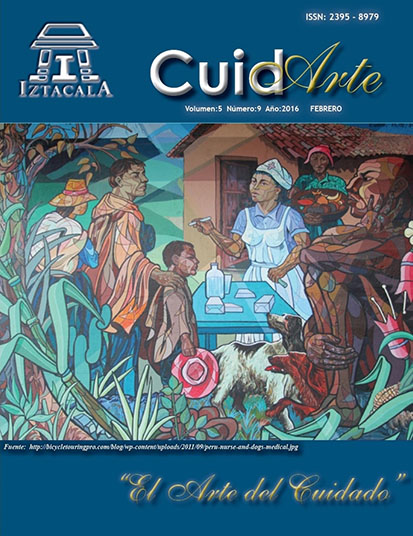Perception of Iztacala FES students about the effects of consuming energy drinks
Main Article Content
Abstract
Energy drinks have focused their
advertisements on people who wish to remain
awake longer. They do so with such slogans as
“a shot of energy,” “gives you wings,” and “for
the one who wants more.” The makers of these
drinks have released little information regarding
the physiological effects of these products, which
include components such as caffeine, taurine, and
ginseng. The purpose of this study is to see how
undergraduate students with health-related majors
enrolled at the Iztacala Faculty of Superior Studies
(FES Iztacala) perceive the consumption of energy
drinks.
To this aim, a qualitative study was conducted
based on an interpretive phenomenological method.
The technique used was that of the semi-structured
interview consisting of a conversation among
equals, “repeated face-to-face meetings between the
researcher and the informers.” Five students from
the health field were interviewed. Per Krueger’s
proposal (1997), the study aimed to determine which
symptoms subjects developed after consuming
energy drinks as well as their knowledge as to the
health consequences of consuming these drinks.
Three components of the students’ perceptions
were studied: their opinions of the drinks, their
knowledge of the beverages’ health consequences,
and the period of time over which students had been
consuming the drinks. The most common symptoms
were anxiety, insomnia, tachycardia, and—in more
severe cases—addiction.
Downloads
Article Details
Citas en Dimensions Service
References
(1) Ramon DM, Camara JM, Cabral FJ, Juarez IE, Diaz JC. Consumo de bebidas energéticas en una población de estudiantes universitarios del estado de Tabasco, México. Salud en Tabasco. Enero-Abril 2013; 19 (1): 10-14.
(2) Bertel L, Dosilc, Molina M, Briceño A, Florez A, Bozo. Energy Beverage Consumption Habits and Mixing with Alcoholic Beverages. Case: School of Medicine Students, Uniersity of Zulia. REDIELUZ. 2013; 3(1 y 2): 8.
(3) Pardo Lozano R, Alvarez García Y, Barral Tafalla D, Farré Albaladejo M. CafeÍna: Un nutriente, un fármaco o una droga de abuso. Adicciones. 2007; 3 (19): 225-238.
(4) Carr L. Bebidas Energéticas, ¿Demasiado peligrosas para su consumo?. Social Nutrition. 4 de Abril de 2013; 4 (4).
(5) Profeco. Estudio de Calidad: Bebidas Energéticas, La chispa Enlatada. Revista del Consumidor. [Revista en línea] [2011] consultado el 12 de Febrero de 2015; 3 (18). Disponible en http://revistadelconsumidor.gob.mx/wp-content/uploads/2011/04/pdf-bebidas2.pdf
(6) Ballistreri MC, Corradi-Webster CM. El uso de bebidas energizantes en estudiantes de educación física. Rev. Latinoamericana.Julio-Agosto 2008; (16).
(7) Ponce y Ponce de León G., Arizona- Amador M. B., Esparza- Betancourt R.I., Mayagoitia-Witrón J.J., Verdugo-Batiz A. Consumo de bebidas energéticas y alcohol: un problema de Salud Pública en estudiantes universitarios. Mexicali, Baja California. Portales médicos.com. Diciembre 2012.
(8) Seifert S, Schaechter J, Hershorin R, Lipshultz S. Efectos sobre la salud de las bebidas energizantes en niños, adolescentes y adultos jóvenes. Conexión Pediátrica. Otoño-Invierno 2011; 1
(9) Fuenmayor P, Araujo M, Vega I, Fuentes F, Fuenmayor AJ. Efectos de Bebidas Energizantes sobre algunos Índices de Función Cardiovascular en Adolescentes del Sexo Femenino sin evidencia ee Enfermedad Cardiovascular. Revista Iberoamericana de Aritmología. Diciembre 2012; 1.
(10) Chávez-Gutiérrez JR, Menjivar-Chacón JW, Sánchez-Cerrato AM, Murcia-Tovar MR, Pineda-Fajardo M. Consumo de Estimulantes en Estudiantes Universitarios. Universidad Nacional Autónoma de Honduras en el Valle de Sula. Junio 2013.
(11) Marczinski CA, Fillmore MT, Bardgett ME, Howard MA. Mezcla de bebidas energéticas con bebidas alcohólicas. Alcohol Clin Exp Res. Febrero de 2013; 37 (2): 188-90.
(12) Medizzine: Portal hispano de medicina, medicamentos y plantas medicinales. Bebidas energéticas: riesgos y beneficios de su consumo. [Revista en línea] [2015] Consultado el 10 de Noviembre de 2015. Disponible en: http://www.medizzine.com/pacientes/nutricion/bebidas_energéticas.php
(13) Proceedings. Clínica de Mayo. Universidad de Texas, Centro para la Ciencia de la Salud, y la Universidad de Queensland, Australia. Noviembre 2010.

